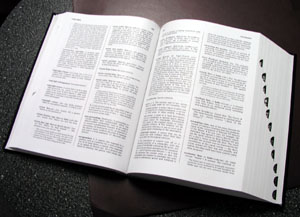Every industry has its own terminology and bizarre acronyms and the tourism industry is no different. I have kept a list of tourism industry vocabulary terms people have asked me about this year. I think that we all want to look like we know what everyone is talking about so sometimes we are hesitant to ask what something means. So if there is a word that you are wondering about that is not on this Tourism Industry Vocabulary list, you can send me an email and I will explain it and add it on to this list. Save this list and take a look at it next time before you go to an industry event and you will look like one of the smartest tourism professionals in the room.
Tourism Industry Terms
A
ABA– American Bus Association. One of the largest trade organizations for the group tour market. They have an annual Marketplace where several thousand tour operators and suppliers (see definition below) meet to create business for all.
B
Bed tax. Most counties and states charge a tax for anyone that stays in a hotel. It can range from a few percentage points to double digits ( see this article). Also called a hotel occupancy tax, the funds are often used to support the local tourism promotion agency, as well as infrastructure repairs.
Black out dates. This is a term for suppliers such as attractions. Are there admission dates you will not sell to tour operators? Some attractions have special events with special pricing and therefore cannot offer the usual discounted rate to a tour operator. In that case, you would let the tour operator know those are blackout dates and they cannot sell tickets on those dates. Another example is for hotels that know they sell out at a higher rate every year on 4th of July – those dates are black out dates for the hotel. Tour operators prefer to work with limited black out dates so use these sparingly.
Buyers– in the tourism industry, a buyer is a tour operator. They ‘buy’ your product from you, whether it is admission tickets, hotel rooms or airline tickets. Buyers can be small mom and pop tour companies, or international online travel agencies. Buyers make us happy!
C
Charters– a tour company will tell you that they work with charters. The definition of a charter is: “the reservation of an aircraft, boat, or bus for private use.” An example is a school band that needs to get to the Macy’s Day Thanksgiving parade. They will charter a bus to get them there. Sometimes charters are just transportation, and sometimes there is some tour planning involved.
D
Direct bill- this is a term a tour operator will use when they want you to bill them on a monthly basis, versus every time a customer of theirs comes to your attraction. This makes sense when you welcome dozens of their groups or individual customers every month. Most suppliers will have a tour operator fill out a credit check before they agree to a direct billing relationship. It does make payment and billing more efficient.
 D.M.O. – Destination Marketing Organization. Often used interchangeably with TPA ( see definition below) this is an organization that works to promote a destination. They can focus on many market such as conventions, group tours, leisure visitors and international visitors. They are often funded by bed tax, membership fees or money made through promotional activities for their partners. A DMO can represent an area as small as a county, or as large as our country ( U.S. Travel )
D.M.O. – Destination Marketing Organization. Often used interchangeably with TPA ( see definition below) this is an organization that works to promote a destination. They can focus on many market such as conventions, group tours, leisure visitors and international visitors. They are often funded by bed tax, membership fees or money made through promotional activities for their partners. A DMO can represent an area as small as a county, or as large as our country ( U.S. Travel )
F
FAM tour– a Familarization tour is a way for tour operators or media to learn more about your destination. These tours are typically organized by a DMO and suppliers are included as a stop on the itinerary. FAMs are the best way for a buyer to learn about your property. I wrote a blog post on best practices for FAM tours earlier this year.
F.I.T. Depending on who you ask, this stands for Foreign Independent traveler,Frequent independent traveler or Financially independent traveler. They all have this in common- it’s one person, a couple or a family instead of a large group. FIT customers can purchase an entire vacation package that included everything, or can pick and choose what elements of a vacation they would like.
Fly-Drive. This is a bare bones package for a FIT customer. Just like it implies, it includes a flight and a rental car. Many companies will upsell fly drives by offering touring ideas with unique stops that they can then book.
G
GDS- Global Distribution system. Wikipedia has a great definition: A Global Distribution System is a network operated by a company that enables automated transactions between travel service providers (mainly airlines, hotels and car rental companies) and travel agencies. Travel agencies traditionally relied on GDS for services, products & rates in order to provision travel-related services to the end consumers.
Group Leaders. Group leaders will bring groups to your attraction, so they are valuable contacts. They usuall do this as a volunteer position, or as a hobby. Many church groups or social organizations fall into this category. They should get a discount from your general admission price, but not as large a discount as a tour operator.
N
NTA – National Tour Association. One of the largest trade organizations for the group tour market. They have an annual Travel Exchange where several thousand tour operators and suppliers (see definition below) meet to create business for all. NTA has a partnership with the Department of Commerce to vet all Chinese tour operators that want to sell tours of the United States. The China Inbound program has over 200 members currently.
O
OTA– Online travel agency. The internet has changed a lot in our industry and the birth and growth of OTA’s is one of the biggest changes. Expedia, Travelocity, Orbitz are all examples of websites where people can book travel directly. Chinese OTA’s such as CTrip and Alitravel will be larger than all the other OTA’s combined within a few years.
P
Pre-formed tour– This is a type of tour group. It means that someone has a group of people who want to travel together and they call a tour operator and have them plan the tour for them. That means that sometimes they have the opportunity to plan a tour to an area they don’t usually feature. Even if all their tours are planned for the year, there might be a preformed group that will have them create something new. Pre-formed groups are opportunities for suppliers and are a good thing!
R
Retail pricing– this is the full ticket price without any discounts. A visitor walking through the door of your attraction pays the retail price. Wholesale (see definition below) is what tour operators and online booking companies like Viator or Expedia will pay.
ROI– stands for Return on Investment. This is a common term in many industries. In our industry, it often refers to judging whether a tradeshow, sales mission or ad campaign was worth the money spent on it. What was our ROI on attending this tradeshow last year. As you can imagine, ROI can be a challenge to track.

S
Shoulder season This is the time of year at an attraction or destination that is between the high season with the most visitors, and the low season with the fewest. Shoulder seasons area often the best place to develop ideas for growth.
Supplier. Suppliers are the businesses that supply tourism product to a travel buyer. That is a technical way to say that a supplier is an attraction, a hotel, a shopping venue, a restaurant or transportation provider. If you welcome visitors, you are most likely a supplier!
T
Tiered Pricing. This is different levels of pricing for different customers. In the group tour industry, retail is the highest price. There is a level with a 10-15% discount for group leaders, and the highest discount ( between 15-30% ) is for tour companies. Look for a future blog post on tiered pricing.
Tour operator/Tour company. This is a business who’s main focus is to sell a package tour to customers. They have websites and staff, which is what separates them from group leaders. They should get a price of 20-30% off your retail price.
Trade shows. There are many trade shows that attractions can attend to get more business. NTA and ABA both have large annual conventions, and there are many regional and state motor coach trade shows as well. This is an efficient way to meet many tour operators in one place, attend educational sessions and network with your peers.
V
Viator– a large online booking company that specializes in attractions and experience ticketing. Viator is now owned by TripAdvisor so your tickets can be sold right from your TripAdvisor listing. I recommend looking in to it for your business.
Voucher– this is a piece of paper that a tour company will have their customer( tour guide or group leader) turn in at your attraction. The voucher confirms that they will pay. This is often easier for companies to use instead of sending a check or paying with a credit card. In order to receive payment, your company will have to show the vouchers that were turned in and bill the company. Vouchers can also be used with FIT guests.
W
Wholesale pricing. This is the lowest level of pricing you offer to a tour company or online travel company. The lower price is necessary because they will purchase your tickets, mark them up and resell them as part of a tour package. Viator asks for wholesale pricing when working with attractions.

Good work
Thanks Derrick! Let me know if there are any terms I should add to the list.